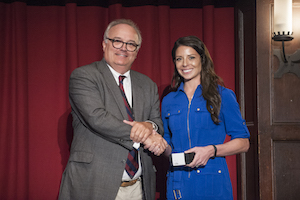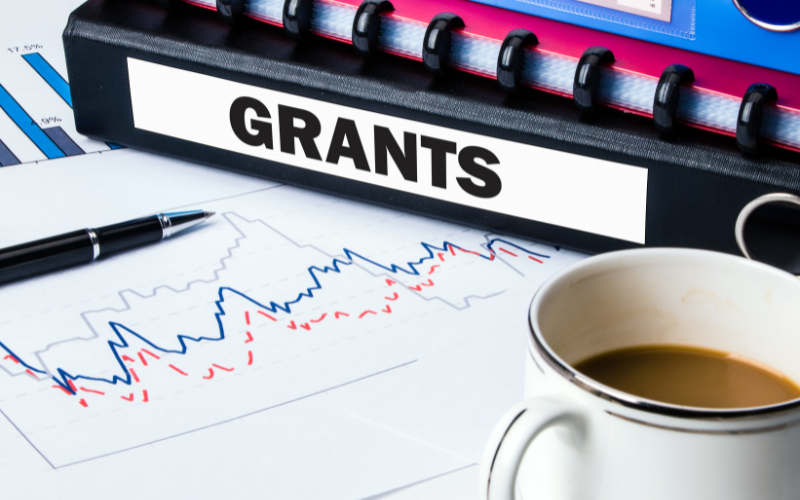The eighth annual University of Pennsylvania Graduate School of Education (Penn GSE) Education Business Plan Competition, co-sponsored by the Milken Family Foundation, was held on campus on April 25. As a Penn GSE graduate, I have been involved with the competition as an early- or finals-round judge since its inception, and APUS has sponsored a major $20,000 Venture Path prize for the past six years. This year’s other finals judges were:
- Geeta Aneja, instructional designer at iTutorGroup;
- Mark Claypool, CEO of ChanceLight Behavioral Health, Therapy, & Education;
- David Cumberbatch, partner at Apogee Equity Partners;
- Brad Lindaas, vice president of strategy at ACT, Inc.;
- Gregory Milken, managing director at March Capital; and
- Archna Sahay, director of entrepreneurial investment, City of Philadelphia.
This year’s 11 Venture Path winners and finalists, in their order of presentation, included the following companies:
- APUS awardee Graphlock offers an affordable scientific and graphing calculator app that not only lowers the cost for students unable to afford the $99-180 devices, but also provides a unique lockdown feature that shuts off all other features on the smartphone or tablet during a test (other than calling 911). The teacher controls the lockdown period by time or by phone and it automatically expires after the student leaves the classroom.
- ChanceLight and Milken grand prize winner SPEAKMODalities offers a cloud-based product that helps individuals with severe autism or developmental disabilities to learn to communicate. The company’s product suite has been developed by scientists utilizing grants from the NIH. The software helps the learner bridge the gap from special ed programs to the mainstream classroom, improving the learner’s quality of life as well as reducing the cost of traditional methods of training.
- ACT prize-winner Awear Technologies has developed smart eyewear designed to assist with neurocognitive training for students with ADHD. The eyewear uses EEG technology to determine when the student is inattentive. The company’s plan is to sell pairs of these specialized glasses to schools and learning centers. The schools will sell training sessions. The company has patented the product and has a small study that shows that the training has improved the attentiveness of students for up to six months. The study may demonstrate positive results for a longer period but the product is too new for a longer study.
- iTutor Group winner dotLearn has developed technology that compresses Khan Academy style videos to a size that can be sent via text message in poor areas of the world that don’t have broadband technology or cannot afford it. This allows subscribers to have video-based education at the data cost of using Whatsapp. The company has currently created test prep videos for math and plan to add future videos in business, chemistry, biology, and economics. The company currently has 4,000 students and hopes to have 5 million students subscribing by 2022.
- Portable Cloud is a product designed for developing markets that will enable classrooms to download learning material content provided by the company as well as act like a hub for Open Educational Resources and the Portable Cloud content. The product costs $500 for each hub and is currently being tested in Zimbabwe.
- Alchemie Solutions is an app that works on smartphones and tablets which is designed to assist high school students with learning Chemistry. The company uses a standards-based learning platform and plans to add other subjects as well as move into the higher ed and training markets over time.
- Sown to Grow designed software that allows students to set learning targets (grades on assignments) and assessments built into the software enables to the student to learn more and achieve their goals. Currently the product is a web app but the company plans to integrate its product with Google’s Learning Management System (LMS).
- ImpactEd’s mission is to bring real world problem solving into university classrooms around the world. With over 60 percent of college seniors unprepared for the job market when they graduate, ImpactEd seeks to match projects submitted by companies to courses offered by universities. In its initial pilot, the company increased student engagement in the class by 22%.
- CommonLit is a non-profit corporation that was established to increase literacy in elementary schools. The product is currently free for students and teachers, but the teachers are guaranteed lifetime access for no charge. Currently 835,000 students and teachers have signed up for the product and the company is adding approximately 45,000 users each week. The cost of offering this product to children is currently $.25/child and the company has a goal of reaching 20 million users by 2020.
- Caribu is a product designed to allow parents to read and draw with their children when they’re not in the same location. The company plans to move from an app model to a subscription model in the third quarter of this year and has 16,000 downloads of its app.
- Lovoco offers a product that is designed to increase learning through auditory and visual cues. Their stenopoly product is designed to allow speakers and instructors to present live with bilingual subtitles translated immediately through artificial intelligence and not through live transcriptionists or translators.
With more than $120,000 in prizes awarded to partipating companies, the Milken-Penn GSE competition is the largest in the U.S. While all of the finalists may not win cash prizes, they are all winners in having been selected from hundreds of entries to make the finals. Finalists from the past have used their selection as a springboard to private equity funding and more than a few have been purchased by other companies or have raised multiple rounds of funding to enable them to continue to grow. Each year I look forward to viewing the latest finalists’ venture pitches and following their subsequent progress.











